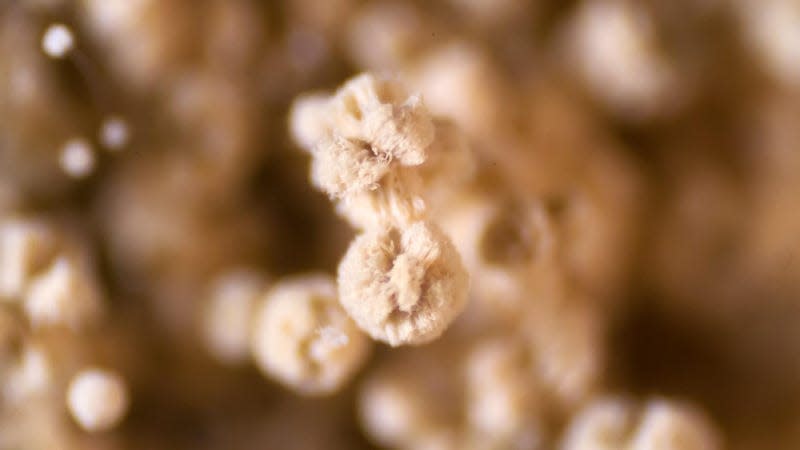There's Been a Staggering Increase in People Killed by Fungi Every Year, Study Finds

An Aspergillus mold under a microscope.
The global burden and death toll of fungi has substantially climbed over the past decade, new research finds. The study estimates that fungal infections help kill nearly 4 million people annually—almost double the amount estimated by similar research in 2012. Co-infections like HIV and tuberculosis, a lack of speedy and reliable diagnostic testing, and growing antifungal resistance are thought to be major contributors to these deaths.
The new research is by David Denning, a fungal infection researcher at the University of Manchester in the UK. Over a decade ago, Denning and his colleagues conducted a review of the available data on the global morbidity and mortality of fungal infections, particularly the infections that can cause severe illness by systemically invading our bodies. Back then, they estimated that fungi directly caused or contributed to the deaths of about 2 million people every year.
Read more
If You Had To Buy A Car Today To Last 250,000 Miles, What Would You Buy?
Aaron Rodgers and Pat McAfee are proof that ESPN only wanted Black talent to ‘stick to sports’
YouTuber Takes Tesla Cybertruck On Cross-Country Roadtrip, Stops 12 Times To Charge Over 1,340 Miles
Fungal-related deaths that happen today are often linked to other health problems, Dennings notes. For instance, he estimates that over 2 million annual cases and 1.8 million deaths of invasive aspergillosis—infections of Aspergillus fungi that typically affect the lungs—occur in people who are struggling with chronic obstructive pulmonary disease, lung or blood cancer, tuberculosis infection, or who are otherwise in intensive care. Fungal infections in general are also estimated to contribute to nearly half of the 600,000 deaths that still happen every year from poorly controlled HIV/AIDS. And it’s possible that Denning’s tally is an underestimate, since he didn’t look at the potential impact of the covid-19 pandemic, which is known to have helped spark large outbreaks of fungal germs inside hard-hit hospitals.
Many of these deaths may have been preventable if doctors were better at proactively recognizing fungal disease, Dennings says. But current diagnostics often fail to detect these infections even when doctors suspect their presence, he adds. We also have relatively few antifungal drugs available, and some germs have quickly learned how to defeat these treatments.
Scientists are working on developing new drugs and other avenues of prevention, such as vaccines. But Dennings says more accurate and readily available tests are also needed to help contain the growing fungal threat to humanity.
“Severe fungal disease strikes when people are already ill, with only a few exceptions in healthy people and in those living or working in moldy homes or work environments. That is why accurate and timely diagnosis is desperately needed, and why we need to take fungi very seriously,” Dennings said in an article discussing his new research published in The Conversation.
More from Gizmodo
Tomb Raider Remaster Fixes The Worst Thing About The Original Trilogy
One FF7 Rebirth Line Changes Everything We Know About Sephiroth
Would You Live in R. Kelly's Newly Listed $3 Million 'Chocolate Factory' Mansion? A Look Inside
Sign up for Gizmodo's Newsletter. For the latest news, Facebook, Twitter and Instagram.

